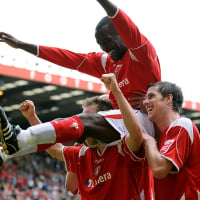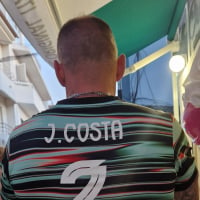Attention: Please take a moment to consider our terms and conditions before posting.
The Takeover Thread - Duchatelet Finally Sells (Jan 2020)
Comments
-
ttnimer is supposed to be worth £500 million, why is he on instagram teasing the fans , either show your hand or disappear, obviously I’m hoping for the former.6
-
Where is £500m from?.Blackheathboy said:ttnimer is supposed to be worth £500 million, why is he on instagram teasing the fans , either show your hand or disappear, obviously I’m hoping for the former.0 -
I know we’re all frustrated waiting for this but that’s just a dumb comment.Blackheathboy said:ttnimer is supposed to be worth £500 million, why is he on instagram teasing the fans , either show your hand or disappear, obviously I’m hoping for the former.17 -
It’s one of the unsubstantiated facts that litter this thread .2
-
I thought the unsubstantiated fact was £200m but could make up any number0
-
2 was the number that someone thought several meant, there was then a debate on this.Alwaysneil said:I thought the unsubstantiated fact was £200m but could make up any number
A couple = 2
A few = 3 maybe 4
Several generally was thought to mean 5, 6 or 7
I think that was the outcome.0 -
Where did the £15billion come from?.Numbers said:
2 was the number that someone thought several meant, there was then a debate on this.Alwaysneil said:I thought the unsubstantiated fact was £200m but could make up any number
A couple = 2
A few = 3 maybe 4
Several generally was thought to mean 5, 6 or 7
I think that was the outcome.0 -
You should know.Numbers said:
2 was the number that someone thought several meant, there was then a debate on this.Alwaysneil said:I thought the unsubstantiated fact was £200m but could make up any number
A couple = 2
A few = 3 maybe 4
Several generally was thought to mean 5, 6 or 7
I think that was the outcome.7 -
Well that's a few severalValley27000 said:
Where did the £15billion come from?.Numbers said:
2 was the number that someone thought several meant, there was then a debate on this.Alwaysneil said:I thought the unsubstantiated fact was £200m but could make up any number
A couple = 2
A few = 3 maybe 4
Several generally was thought to mean 5, 6 or 7
I think that was the outcome.3 -
 it’s finally happening...I am now getting excited...in the words of Tahnoon “very soon will change everything” 3
it’s finally happening...I am now getting excited...in the words of Tahnoon “very soon will change everything” 3 -
Sponsored links:
-
The Abu Dhabi royal family member that definitely has absolutely nothing to do with us.Valley27000 said:
Where did the £15billion come from?.Numbers said:
2 was the number that someone thought several meant, there was then a debate on this.Alwaysneil said:I thought the unsubstantiated fact was £200m but could make up any number
A couple = 2
A few = 3 maybe 4
Several generally was thought to mean 5, 6 or 7
I think that was the outcome.3 -
New crest alert.TheAddicks4Ever said: it’s finally happening...I am now getting excited...in the words of Tahnoon “very soon will change everything” 2
it’s finally happening...I am now getting excited...in the words of Tahnoon “very soon will change everything” 2 -
We're moving stadiums?0
-
Yeah...this will all be yuppie flats $$$$$$$sammy391 said:Bedsaddick said:More teasing from our owner ? Nimers caption for the photo is “very soon will change everything”
Nimers caption for the photo is “very soon will change everything”
matt southall has commented on the post saying “😎👌🏻“
Jokes1 -
Other than injecting a shed load of cash.carly burn said:
The Abu Dhabi royal family member that definitely has absolutely nothing to do with us.Valley27000 said:
Where did the £15billion come from?.Numbers said:
2 was the number that someone thought several meant, there was then a debate on this.Alwaysneil said:I thought the unsubstantiated fact was £200m but could make up any number
A couple = 2
A few = 3 maybe 4
Several generally was thought to mean 5, 6 or 7
I think that was the outcome.1 -
£250billion.carly burn said:
The Abu Dhabi royal family member that definitely has absolutely nothing to do with us.Valley27000 said:
Where did the £15billion come from?.Numbers said:
2 was the number that someone thought several meant, there was then a debate on this.Alwaysneil said:I thought the unsubstantiated fact was £200m but could make up any number
A couple = 2
A few = 3 maybe 4
Several generally was thought to mean 5, 6 or 7
I think that was the outcome.0 -
Well I wouldn’t say definitely 😬carly burn said:
The Abu Dhabi royal family member that definitely has absolutely nothing to do with us.Valley27000 said:
Where did the £15billion come from?.Numbers said:
2 was the number that someone thought several meant, there was then a debate on this.Alwaysneil said:I thought the unsubstantiated fact was £200m but could make up any number
A couple = 2
A few = 3 maybe 4
Several generally was thought to mean 5, 6 or 7
I think that was the outcome.0 -
Depends who's asking. ;-)Taxi_Lad said:
Well I wouldn’t say definitely 😬carly burn said:
The Abu Dhabi royal family member that definitely has absolutely nothing to do with us.Valley27000 said:
Where did the £15billion come from?.Numbers said:
2 was the number that someone thought several meant, there was then a debate on this.Alwaysneil said:I thought the unsubstantiated fact was £200m but could make up any number
A couple = 2
A few = 3 maybe 4
Several generally was thought to mean 5, 6 or 7
I think that was the outcome.5 -
The £200m is his post office savings account. The other £3bm is in his ISA account that’s accumulated a lot of interest over the years that he’s set aside for a rainy day. Hence the purchase of CAFC in January. FACT5
-
No Premium Bonds?Solidgone said:The £200m is his post office savings account. The other £3bm is in his ISA account that’s accumulated a lot of interest over the years that he’s set aside for a rainy day. Hence the purchase of CAFC in January. FACT0 -
Sponsored links:
-
I don’t have that information 😉0
-
I’m really looking forward to the first statement by the new owner once this is done and dusted. Obviously we’re not going to be party to everything but the club is on the edge of a new era and it’s very exciting.7
-
All tied up in green shield stamps and luncheon vouchersLargeAddick said:
No Premium Bonds?Solidgone said:The £200m is his post office savings account. The other £3bm is in his ISA account that’s accumulated a lot of interest over the years that he’s set aside for a rainy day. Hence the purchase of CAFC in January. FACT2 -
Going to be a very interesting time for us all this has the potential to be amazing42
-
I want parking to be a problem, queues at the turnstiles and Klopp with his head in his hands as the third goal goes in .20
-
Think we’re all getting desperate now, the Takeover needs to happen this week , players need to arrive now and returning injured players need to step up quickly.1 -
Premier League football stinks, but that is the 'price' of successBlackheathboy said:I want parking to be a problem, queues at the turnstiles and Klopp with his head in his hands as the third goal goes in .1 -
Is Veri Soon our new Korean signing pencilled in for tomorrow?2
-
First job, straighten the badge.JamesSeed said:
New crest alert.TheAddicks4Ever said: it’s finally happening...I am now getting excited...in the words of Tahnoon “very soon will change everything” 4
it’s finally happening...I am now getting excited...in the words of Tahnoon “very soon will change everything” 4 -
fans bar to be linked to enable access to and from museum - museum to double as a shisha / belly dancing / strip bar on matchdays5
This discussion has been closed.













